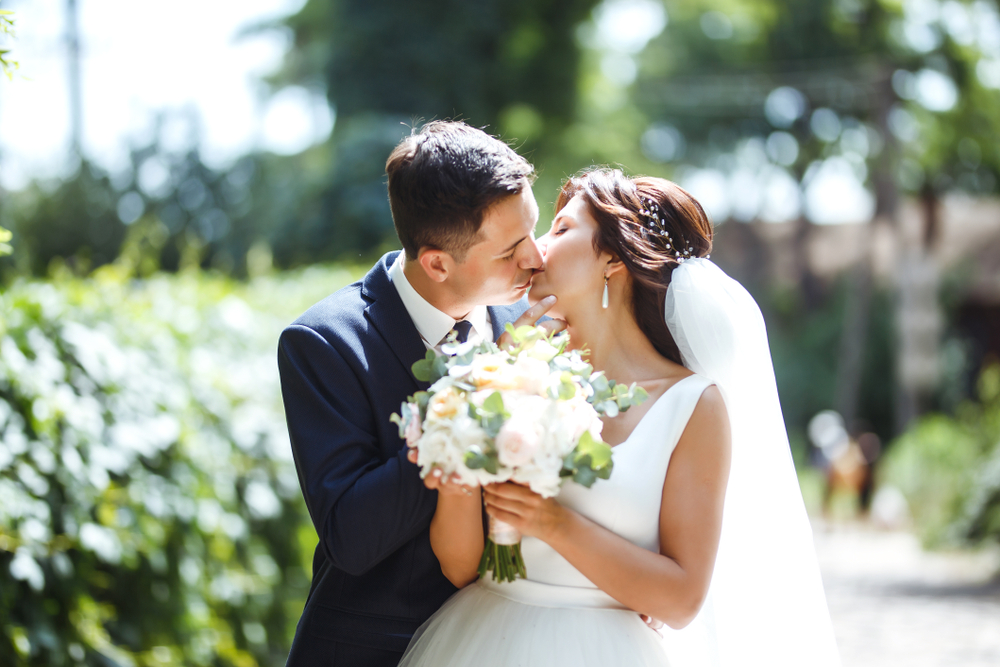If you’ve ever attended a wedding, or if you’re planning a wedding yourself, you might have heard the phrase “lawfully wedded wife” and wondered what it meant.
Is this a derogatory term? Is it something that a future wife or woman should be proud to be? And how exactly does the law factor into marriage or weddings? The more you think about what this term means, the more questions you might begin to ask yourself!
Fortunately, we’ve done our research and can tell you that the meaning of “lawfully wedded wife” isn’t a negative term at all.
The term “lawfully wedded wife” means that the woman in the marriage underwent a religious and/or legal ceremony to obtain the status of “wife.”
This is a term that is used mostly in Catholic weddings and is a term that distinguishes a lawfully wedded wife from other women.
When studying its true meaning, it’s important to look at not just what it means to be “lawfully” wedded, but also “wedded” in general.
Table of Contents
Where did the term originate?

The term “lawfully wedded wife” is commonly used in marriage vows – vows that have been around for ages.
Perhaps they weren’t as ornate or as beautiful as they are now, but wedding vows simply represent two people’s commitment to each by using spoken words.
The traditional wedding vows that we know so well today, which is where we hear the term “lawfully wedded wife,” originated in the mid-1500s from the Medieval Church of England.
These weddings vows were known as the Sarum Rite, and they were originally in Latin and were performed for Roman Catholic weddings.
Is the term “lawfully wedded wife” only used in Catholic weddings?
The short answer is no; however, depending on your religion, there is a variety of different wedding vows to choose from.
Again, a wedding vow can be as simple as you telling your spouse you will be there for them through thick and thin.
However, there are many religions and ceremonies that have standard wedding vows, each with its own origin.
The Catholic wedding vow is, traditionally, as follows:
“I, (name of spouse), take you, (name of other spouse), for my lawful wife/husband, to have and to hold from this day forward, for better, for worse, for richer, for poorer, in sickness and health, until death do us part.”
“I, (name of spouse), take you, (name of spouse), to be my husband/wife. I promise to be true to you in good times and in bad, in sickness and in health. I will love and honor you all the days of my life.”
The reason this wedding vow is somewhat standard is because of just how big the Roman Catholic church was in the 16th century.
Although now Catholics only account for 16% of the world’s population, in the 16th century almost the entire population of the “known” world (the European hemisphere) was Catholic up until the Protestants emerged and split from the Catholic Church.
Although not all religions use the term “lawfully” in their wedding vows, many still use the term “wedded,” such as in traditional Christian weddings.
It’s important to note that these two terms are slightly different, and there’s a reason why you still might want to include the term “lawfully” into your wedding vows (if you want to of course).
What does “lawfully” mean?

To put it simply, when someone says they did something “lawfully” it means it was done under the direction of the law, legally, or they did nothing illegal.
Although most marriages nowadays aren’t “illegal,” per se (unless you’re dealing with incestuous marriages or marriage with an underaged person), at one point not everyone who was married went through the proper channels to do so.
This means buying a marriage license or notifying the church of the impending union.
The church required such notices in the early 12th century, and after the 1500s began requiring proof of couples vowing allegiance to each other (hence, the famous “lawfully wedded” wedding vow).
Some marriages are also known as “common-law” marriages and are still recognized today only in some instances and in certain states.
For instance, Texas recognizes common-law marriages, which are usually marriages where a couple has lived together for a number of years or even shares property and children, but isn’t legally married.
Texas is one of only a handful of states that recognizes common-law marriages (where there’s no need for “lawfully” to be included in a wedding vow), including:
- South Carolina
- Utah
- New Hampshire
- Montana
- Kansas
- Iowa
- Colorado
In the end, the “lawfully” was placed in a wedding vow to ensure all witnesses and parties that attended the wedding that the couple was truly entering into a legally and spiritually binding commitment, whether for their church, their religion, or their state.
Being someone’s lawfully wedded spouse also has legal ramifications, including during divorce proceedings, child custody hearings, property, death and probate proceedings, and more.
Before you simply toss the term “lawfully” into your wedding vow, it’s important to ensure you’re truly ready to take on the legal and spiritual consequences of having a spouse.
Are my vows legally binding?

If you’re second-guessing whether or not to include the term “lawfully” wedded into your vows, you should relax and keep in mind that these wedding vows aren’t legally binding.
In fact, wedding vows are mostly for you to share your emotions with your partner and have more cultural and religious significance than anything.
However, we suggest only using the term if you’re willing to tell people you have undergone all appropriate steps to be “legally” married.
This includes:
- Filing a marriage license
- Updating tax information
- Having a ceremony officiated by a judge, chaplain, etc. and two witnesses
- Following all state and county laws for marriage
- Turning in a blood test (only some states)
Once you’ve done all this, you can confidently shout to the mountains that you are someone’s lawfully wedded wife! But, you can still choose to simply say “wedded” instead if you are more comfortable with that.
What does “wedded” mean?
Being someone’s wedded wife carries with it a lot fewer questions, and is a lot more flexible than stating you’re someone’s lawfully wedded wife.
As we mentioned earlier, “lawfully wedded” means you’ve gone through the legal processes of being married.
But, what if you choose not to undergo all the processes and legal mumbo jumbo?
What if you still want the title of being someone’s wedded wife or husband without having to include the term lawfully in there?
The good news is that there are many vows that only include the term “wedded wife,” which means that you and your husband have been wed in matrimony.
Even though your husband may have lived with another woman in the past and had long-term relationships, you are now his truly “wedded wife” because of the wedding ceremony.
This might be an attractive choice of words, especially if you don’t traditionally believe in the institution of marriage.
For other purposes, you might want to exclude the term lawfully altogether, which is completely fine.
Relationship vows for people who don’t believe in marriage

If the idea of marriage makes you roll your eyes, become depressed, or even anxious, you’re not alone.
Many celebrities have dated for decades without tying the knot, showing that not everyone has to conform to the ideas of a traditional marriage or being a “lawfully wedded wife,” even if the entire media spotlight is on them.
If celebrities stick to their ideals even with the whole world watching, so can you! Marriage is a decision that should be thought about seriously before taking your vows.
Without thinking long and hard about marriage or the state of your relationship before marriage, the marriage might fail.
For a marriage that is truly not meant to be, no amount of wedding vows or wordage will be able to save it from crumbling.
Although this might be a sad truth, it’s something you must be honest with yourself about before deciding to spend time, money, and energy on a wedding ceremony.
Instead, you can opt to date your significant other as long as you want, or even choose to start a life and family without any legal entities involved.
If you’d still like to have a small ceremony and would like to make your own wedding vows, here are some ideas.
Memories
Is the first time you met your partner a cherished memory? Or perhaps you love the memory of your first date? What about a memory from a simple day at the beach?
Memories make the heart grow fond. They’re what creates happiness and remind us of why we love our partners.
Consider writing a heartfelt memory you have and sharing it with your partner.
Jokes
Every couple has an inside joke that makes them both laugh. When writing your relationship vows, why not incorporate this into your tribute?
This will not only lighten the mood but also remind you and your partner of the humor in your relationship and why you can’t imagine laughing like this with any other person.
Songs
If you play an instrument, sing, or even like to do spoken word or poetry, there’s no better way to show your affection and love for your partner than with a heartfelt song.
Consider writing one and sharing your true emotions with your loved one.
Find your own meaning
“Lawfully wedded wife” means that you have undergone the legal requirements through your state or church to be wed to your husband.
However, there are lots of other vows you can choose from to fit your relationship. These can be just as beautiful and just as powerful as the traditional Catholic vows.
Whether you want to keep your strong Catholic traditions or want to opt for a small wedding, or even want to omit marriage entirely, remember that your relationship isn’t simply based on a vow and you are much more than a lawfully wedded wife – you’re your husband’s life partner.




